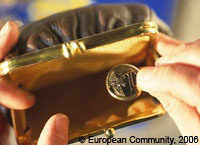Commission announces measures to triple investment in young SMEs
The European Commission has unveiled a set of measures designed to help small companies get easier access to finance, enabling them to start up, and then to expand. The Commission aims to triple annual early-stage investment in the EU from €2 billion to €6 billion by 2013. The measures to make this possible fall into four categories: EU funding for small and medium sized enterprises (SMEs); boosting risk capital funds; more bank finance for innovation; and Member State activities. 'With today's initiative we want to tackle a persistent problem which puts a brake on small enterprises to grow,' said Enterprise and Industry Commissioner Günter Verheugen. 'People with smart business ideas, companies which would like to expand have persistent difficulties to get loans from their banks or equity capital from the market.' Under the heading of 'More money for financing SMEs', the Commission refers to the Competitiveness and Innovation Framework Programme (CIP), already approved by the European Parliament, which will provide €1 billion for innovative SMEs between 2007 and 2013. The Commission predicts that the programme will leverage an additional €30 billion, and that some 400,000 SMEs will benefit from EU investment support. The potential of this funding is clear when one looks at the story of the Internet communications company Skype. The peer-to-peer phone services provider was an early beneficiary of the Commission's ETF start-up facility investment. The fund allowed the European Investment Fund (EIF) to appropriate business incubators offering operational support to SMEs with growth potential. The EIF placed the ETF funds with Mangrove Capital Partners in Luxembourg, which invested in Skype. Skype was acquired by eBay in October 2005, and was included in the list of 100 best-performing and innovative high tech private companies of Europe and Israel, created by Tornado 100 in January 2005. Niklas Zennstrom, CEO of Skype, reacted to the Commission's announcement on 30 June, welcoming the initiative, but underlining the areas needing attention: 'One of the key challenges facing the European entrepreneur is how to stimulate and manage fast growth in a new company. To do this effectively, s/he needs to be able to take swift action on a variety of factors anywhere from sourcing financing, to the incorporation of the new company, to hiring employees,' he said in a statement. 'I am encouraged by the Commission's efforts to begin to address the dual problems of local access to capital and the regulatory rigidities present in many national markets in Europe. The reduction of regulatory red tape, in particular, will help stimulate innovation and success in Europe's SME sector,' Mr Zennstrom added. Another area of focus for the Commission is boosting risk capital funds. The Commission pledges to 'actively work together with the Member States towards removing obstacles for EU-wide presence of venture capital funds, enhancing investors' interest in seed investment'. The idea is to stimulate the emergence of more professional and more successful venture capital funds. The Commission is also reviewing state aid rules for risk capital funds, in particular young, innovative companies. On 'More bank finance for innovation', the Commission will organise a meeting between banks and SMEs on how to improve the chances for long-term banking relationships. The Commission also emphasises that it will promote micro credit and mezzanine financing (a combination of equity and debt), and evaluate the advantages of tax relief systems for young, innovative companies. While the Commission is doing what it can with this set of measures, it is calling on the EU Member States to do their part in supporting SMEs. It is 'mainly the responsibility of Member States to ensure that the regulatory and fiscal environment encourages entrepreneurs to develop good ideas into new services and products and for the financial markets to finance these', says the Commission. The Commission provides a list of actions for the Member states: - implement investment readiness programmes; - promote cooperation among fragmented local support organisations; - use good practices in implementing risk capital policies at all levels; - aspire to stability and long-term view in public policies on risk capital; - study the advantages of introducing a Young Innovative Company Scheme; - consider the advantages of expanding the market for hybrid instruments in SME finance; - efficiently use the JEREMIE process to obtain a set of financial products specifically engineered for SMEs; - consider the possibilities for a more neutral taxation of the different forms of enterprise financing.



